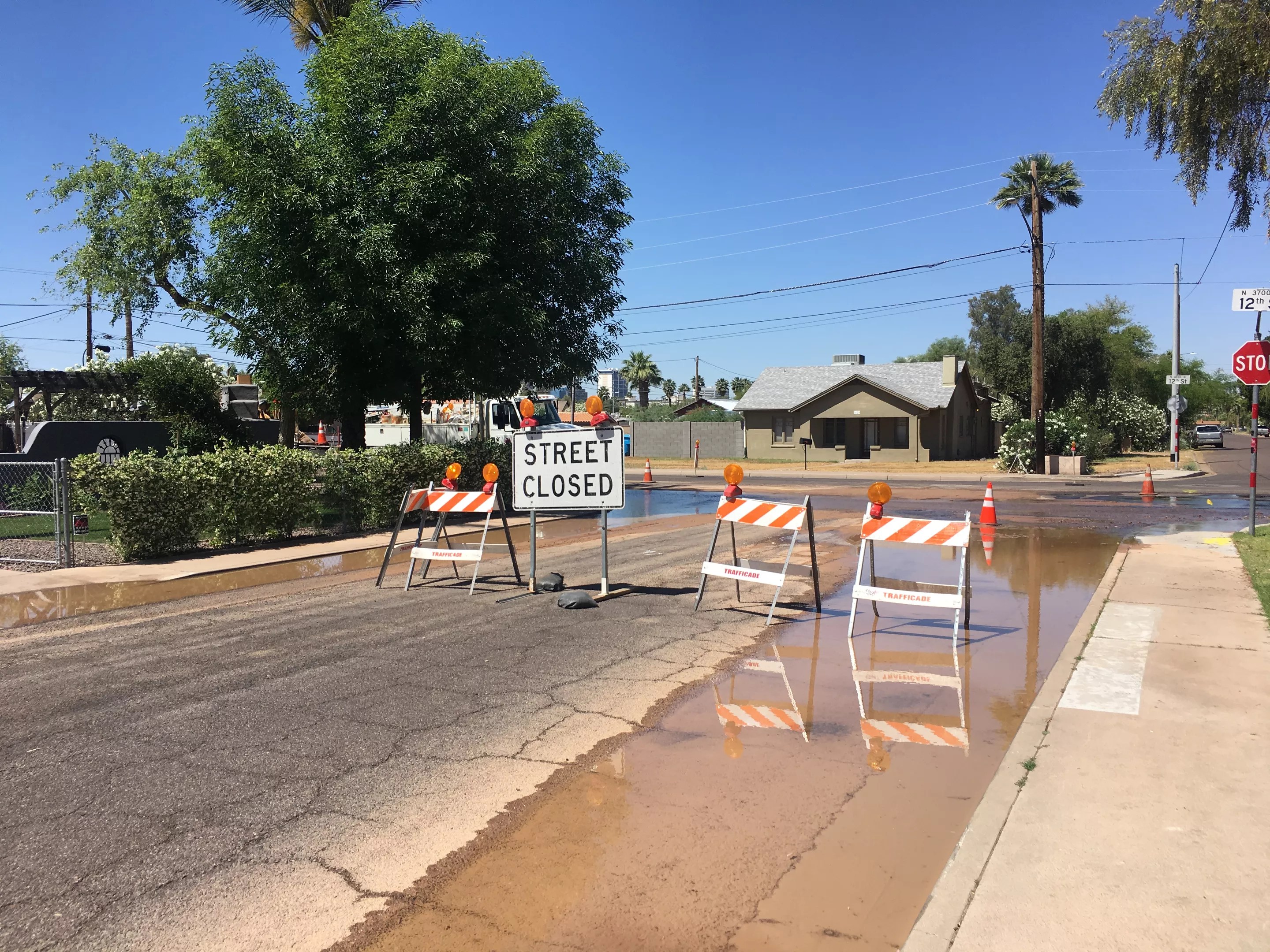
Elizabeth Whitman

Audio By Carbonatix
An assistant director of Phoenix’s vaunted Water Services Department quietly stepped down a few months ago after internal investigations found that she had discriminated against and intimidated employees.
Those investigations also depicted the ex-assistant director, Alisha Solano, as presiding over a hostile, anxiety-inducing workplace. Their findings corroborate reports of ongoing issues in the Water Services Department, where customer service employees, who fell under Solano’s purview, have spoken out in recent months about favoritism and a toxic work environment.
In May, several employees in the distribution division were fired following an investigation into sexual harassment that included one man slapping another in the face with a sex toy. Newly leaked internal chats show mid- and low-level supervisors mocking customer service employees, calling them “the worst of the worst,” and joking about burning down city facilities.
Solano’s case shows how those problems permeate the department, from upper management down to front-line customer service specialists. These grievances also indicate deeper issues with accountability and management in one of the most important departments in the fifth-largest city in the country. The Water Services Department has nearly 1,500 full-time employees and supplies drinking water to more than 1.5 million customers, billing about $850 million every year.
On Friday morning, a day after Phoenix New Times sent questions to Director Kathryn Sorensen and department spokesperson Stephanie Bracken regarding this story, Bracken sent out a department-wide email warning employees about talking to the media without going through her or another public information officer.
The email, which was shared with New Times, included the city’s policy on talking to media, and the veiled threat that “it is a violation of this [regulation] to talk to media without going through the department’s Public Information staff.”
‘Suspicious and micromanaging’
Solano’s management style came under scrutiny in July 2017, about two and a half years after she began working for the city as an assistant water services director. An employee filed a complaint against her with Phoenix’s Equal Opportunity Department, which investigates claims of harassment and discrimination. New Times obtained investigative reports, memos, and other documents relevant to those investigations and Solano’s employment through public records requests.
The resulting EOD investigation determined that Solano violated city regulations by discriminating and retaliating against the employee for taking leave under the federal Family and Medical Leave Act. According to one memo about the violations, Solano named the employee during a meeting with colleagues and requested “an excessive number” of audits of her leave time.
Solano also tracked the employee minutely, “compil[ing] a notebook documenting concerns related to her leave, availability, and lateness of deliverables during times when she was out on protected leave,” a memo said.
The investigation also found that one employee would come to work sick because they were too scared to ask Solano for sick time. One employee had quit because of the department’s inflexibility in scheduling leave. Solano was described as “suspicious and micromanaging” about attendance.

The Phoenix Water Services Department is responsible for bringing drinking water to more than 1.5 million customers, including handling repairs to infrastructure.
Elizabeth Whitman
That 2017 complaint against Solano was one of 58 filed with the EOD against the Water Services Department that year, when complaints surged from an annual average of about 17 over the previous six years. The number of complaints stayed high in 2018, when the department received 53.
The findings of the EOD investigation into Solano were damning, although not quite damning enough for the city to fire her.
In February 2018, seven months after the complaint was filed, the city’s human resources director, Lori Bays, recommended suspending Solano 40 to 80 hours, although regulations permitted discipline “up to and including termination.” Bays also recommended stripping Solano of her authority over the department’s human resources division.
Solano served a five-day suspension – the minimum recommended discipline – in March 2018, but she also appealed that suspension to the city’s Civil Service Board.
One morning in late August, shortly before she was scheduled to appear for a hearing in her appeal, she visited an office of the Water Services Department – not her office – where a person scheduled to testify against her worked. Solano lingered for a bit, then left shortly after the person showed up to work.
That decision proved to be Solano’s downfall.
A good deal
The witness filed a complaint with the EOD, which investigated Solano again and declared her lurking to be a retaliatory “act of intimidation.” The investigation, for which the EOD interviewed multiple other witnesses, also revealed that the menacing behavior was only the latest in a series of power moves and potentially vengeful acts by Solano.
After the first EOD investigation, Solano requested a copy of that probe. Her lawyer, Lori Brown, subpoenaed the entire case file. Together, Solano later confessed to the EOD, they identified a witness in the first investigation into Solano.
Because New Times‘ copies of those reports are heavily redacted, it’s not possible to cross-reference the witness whom Solano identified with claims from witnesses who said that Solano had targeted or become more critical of them after the EOD investigation. Neither Brown nor Solano responded to New Times‘ requests seeking comment for this story.
Per city regulations, witnesses are supposed to be protected from retaliation for their participation in EOD cases, and Solano told investigators that she did not treat the witness differently after discovering the testimony against her.
Witnesses interviewed for the second investigation told the EOD otherwise.
They said that Solano, along with another employee whose name was redacted, would “target other employees they are not happy with.” They were “relentless in using the process and system to their benefit,” including by pressuring people into quitting or submitting.
One witness said that this poor treatment increased after the investigation concluded. Another hesitated to give a statement to the EOD at all, expressing “reservations regarding Ms. Solano retaliating if she discovered he had given a statement.”
When EOD interviewed Sorensen about the allegations against Solano, the director either gently defended Solano or claimed ignorance. She told investigators that she didn’t see daily interactions between Solano and one of the witnesses, and so she couldn’t comment.
Asked whether she knew about Solano’s office visit on the morning of the Civil Service Board hearing, Sorensen told investigators that she could only speculate “that Ms. Solano was embarrassed and did not want to be in her office because everyone knew about the hearing,” although she conceded that Solano could have waited somewhere else prior to the hearing.
“Ms. Solano created a chilling effect on those who wished to exercise their rights,” wrote Lori Bays, human resources director for the city of Phoenix.
In the end, the Water Services Department’s HR division called Solano’s behavior that August morning “intimidating and retaliatory.” It aimed to deter the person from giving testimony, reads a pre-termination memo dated November 29, 2018 – “poor judgment and not behavior expected of an Assistant Director.”
The city planned to fire Solano, the memo said. She was told to work from home and was barred from contacting city employees.
“Ms. Solano created a chilling effect on those who wished to exercise their rights,” Bays, the city HR director, wrote in a memo to Sorensen in which she recommended firing Solano.
But earlier that month, in November, Solano had filed a complaint of her own with the federal Equal Employment Opportunity Commission, alleging discrimination and retaliation.
To avoid litigation, the city and Solano struck a deal. According to the settlement agreement, Solano would be allowed to work from home, with pay, through February 28, 2019. Her vacation time would be paid out (the total came to just under $1,580, for 24 hours of vacation paid out at $65.83 per hour, records show), and she had to resign by April 15, 2019.
The city also agreed to reimburse her for 40 hours of work. The agreement doesn’t specify whether that was intended to make up for Solano’s suspension.
As part of the deal, the city agreed to remove several incriminating documents from Solano’s personnel file, including the discipline notice detailing her five-day suspension, the memos from Human Resources laying out the EOD investigations into the claims against her, and the pre-termination notice.
In return, Solano had to sign a resignation letter by April 15, 2019. She had to close her case with the federal EEOC, and she would have to withdraw her appeal to the Civil Service Board. Solano signed the agreement on December 31, 2018, and Sorensen signed it two days later.
On April 15, 2019, 21 months after the first discrimination complaint was filed against her, Solano resigned.
In response to questions from New Times about Solano’s tenure and her resignation, Sorensen touted the achievements of Phoenix Water Services, saying that it “is recognized as one of the best run utilities in the country,” with a strong safety record, investments in employee success, and a productive, efficient water delivery operation. She pointed out that the department has won numerous industry awards.
She added that any organization of the Water Services Department’s size will have personnel issues, and that, far from ignoring those issues, “I have empowered employees to speak up, and have worked to resolve these issues in a manner that is fair and consistent to move our organization continually forward.”
New Times was focusing on “a small number of concerns and issues” that “in no way reflect upon the organization broadly, our many fantastic employees, or the services we provide to the community 24/7/365 in support of public health, economic opportunity, and quality of life,” Sorensen said.
Close ties
It’s not clear why it took nearly two years after the first investigation for Solano to face firing, or how that length of time compared to similar cases involving other high-level managers in the city or the department, or whether a different person in the same situation would have been fired after the initial EOD investigation, rather than suspended as Solano was. The substantiated accusations made against Solano in Phoenix were not the first claims of discrimination against her.
Asked about Solano’s settlement, Bracken, the department’s spokesperson, said, “It is not uncommon for the City to settle personnel disputes to avoid costly litigation.”
“It is also not uncommon for managers to resign in lieu of termination. The discipline is an example of the organization’s fair and thorough investigation process for all staff levels, including assistant directors,” she added.
Records show Solano has a long history with department director Sorensen. Solano first worked under Sorensen when they were both employed in the Water Resources Department in Mesa, and she earned glowing praise from Sorensen during annual reviews.
“Wow. Every day I feel grateful that Alisha is on my team,” Sorensen wrote in a performance review in spring 2012. “She is competent, intelligent, hard-working, fair, funny, and kind. Alisha is an outstanding financial and personnel manager.” She added that Solano “demonstrates great personal integrity every day.”

Kathryn Sorensen at the Water Innovation Summit in December 2018.
Gage Skidmore via Flickr
Those who have worked under Solano, however, might disagree.
In May 2009, when Solano was a management assistant in the utilities department, two longtime employees filed a notice of claim, the precursor to a lawsuit, against the city of Mesa. They each sought $1 million in compensation, alleging that Solano had discriminated against them for their disabilities. One employee had Crohn’s disease, and the other had fibromyalgia. Their lawyer told the East Valley Tribune at the time that both employees had had no problems at work until they began reporting to Solano.
Kevin Christopher, a spokesperson for the city of Mesa, said that no lawsuit was ever filed. It’s not clear how the city ultimately handled the dispute. But two months after the notice of claim was filed, in July 2009, Solano was transferred. She went from Utilities to Water Resources, where she was quickly made deputy director, although she did not receive a raise, her personnel file from the city of Mesa shows.
In August 2013, Sorensen left Mesa and become Phoenix’s water services director. A little over a year later, Solano applied for a job as assistant water services director in Phoenix. Within two months, she was offered the job, with an annual salary of $119,000.
Solano’s practice of targeting employees fits a trend at the Water Services Department. Employees there who have spoken out say that upper management sets the tone for lower-level supervisors, fueling a cruel and toxic culture that touches everyone. For example, chats between low and mid-level supervisors in the customer service department, obtained through a public records request by a former employee and shared with New Times, show them deriding people they oversaw.
After overhearing two employees talk about bereavement leave, accountant Cynthia Chambers messaged her sister-in-law, Savannah Havier, who worked as a supervisor. Chambers ripped those employees by name as “seeking out more ‘free time.'”
Havier responded with a face-palm emoji, then wrote, “Your mom told me a story about an employee she had who’s [sic] mother passed away three times before HR finally told her no more”. Chambers replied that one employee “wants to just be off on bereavement if her third cousin twice removed passed.”
In another conversation, this time between Chambers and assistant administrator Teresa Holguin, Holguin described employees at pay stations, who deal directly with customers, as “the worst of the worst.”
Those leaked chats also showed Chambers asking Havier (in jest, presumably), “Do you feel like setting the pay stations on fire and walking away yet?”
“All the time!” Havier responded.
The former employee, Reyna Aspericueta said, “I was just in shock about how managers were talking about us, the employees.” She said she had worked for the water department in customer service for about 10 months, and had been picked on before being fired for making mistakes that other employees, who were not fired, also made.